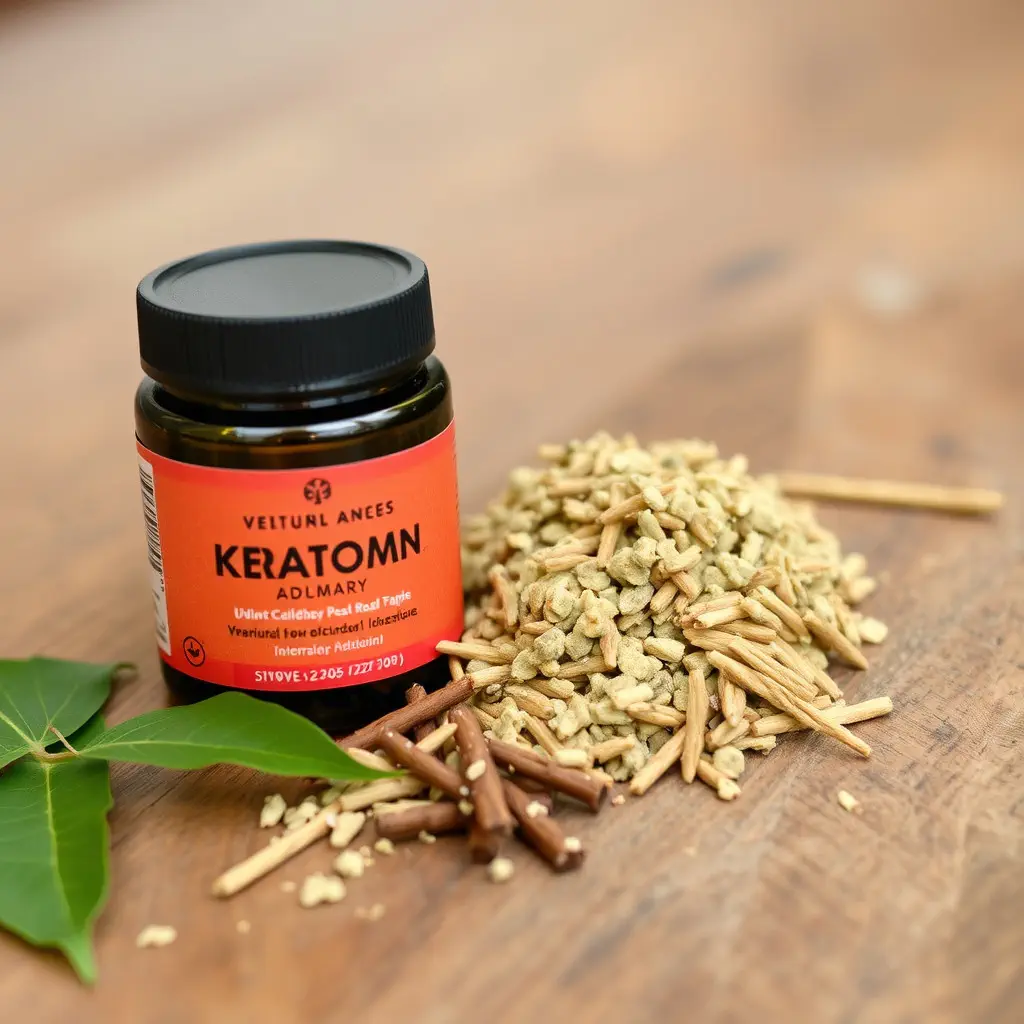Muscle soreness, known as Delayed-Onset Muscle Soreness (DOMS), typically occurs after intense physical activity and is characterized by muscle pain and tenderness. This condition results from the body's response to muscular stress, involving inflammation and micro-tearing of muscle fibers as part of an adaptation process. Kratom, derived from the Mitragyna speciosa plant, has been investigated for its analgesic properties in managing this muscle soreness due to its active alkaloids, mitraphylline and 7-hydroxymitragynine, which may engage with opioid receptors to provide pain relief. In Michigan, the legality of kratom is subject to specific regulations that cap the alkaloid content, particularly 7-hydroxymitragynine, at less than 0.15%. Users should adhere to these state guidelines and consult healthcare professionals before using kratom as part of a recovery regimen. It's important to consider dosage based on individual factors like tolerance and weight, with typical pain relief doses ranging from 5 to 15 grams of dried leaves. Kratom can be a part of a natural approach to muscle recovery when used responsibly and within the confines of the law in Michigan. Always monitor your body's response and be aware that higher doses may amplify effects but also increase potential adverse reactions. Remember that kratom is a substance with traditional uses in Southeast Asia, and its use for pain relief should be integrated into a broader recovery strategy that includes rest, hydration, nutrition, and professional medical advice.
Muscle soreness can be an inevitable and sometimes debilitating consequence of intense physical activity, leaving many athletes and fitness enthusiasts seeking effective relief. Enter kratom, a supplement that has garnered attention for its potential analgesic properties. As we explore how kratom might alleviate muscle pain, it’s crucial to address its legal standing in Michigan, where its use is subject to specific regulations. This article delves into the mechanisms behind kratom’s effects on muscle soreness, offers guidance on safe usage and dosage, and provides a comprehensive overview of incorporating this supplement into your recovery routine within the bounds of Michigan’s legal framework. Is kratom legal in Michigan? Let’s unravel this and more to aid in your pursuit of relief from muscle soreness.
- Understanding Muscle Soreness and Kratom's Role: A Glimpse into its Legal Status in Michigan
- Exploring Kratom's Potential for Muscle Soreness Relief: Mechanisms and Methods
- Safe Practices and Effective Dosages: Incorporating Kratom into Your Muscle Recovery Routine with a Focus on Legal Considerations in Michigan
Understanding Muscle Soreness and Kratom's Role: A Glimpse into its Legal Status in Michigan

Muscle soreness can arise from various activities, ranging from intense exercise to strenuous physical labor, and it often manifests as delayed-onset muscle soreness (DOMS). This condition is characterized by pain and tenderness in the muscles that typically occurs within 24 to 72 hours post-exercise. The mechanisms behind DOMS are complex and not fully understood, but they involve inflammation and micro-tears in the muscle fibers, which are part of the body’s natural adaptation process to the stress placed upon them. Understanding the origin of muscle soreness is crucial for devising effective relief strategies.
Kratom, a botanical supplement derived from the leaves of Mitragyna speciosa, has garnered attention in various circles for its potential analgesic properties. In the context of muscle soreness, kratom may offer relief due to its active alkaloids, such as mitraphylline and 7-hydroxymitragynine, which are believed to interact with opioid receptors in the brain. Users report that kratom can help manage pain levels effectively. However, it’s important to approach the use of kratom with caution, especially as its legal status varies by state and region. In Michigan, the legal standing of kratom is subject to change; as of recent updates, kratom is not explicitly banned at the federal level, and its legality in Michigan hinges on specific alkaloid concentrations. The Michigan Department of Agriculture and Rural Development has regulations in place that define kratom products legal for sale based on alkaloid content. Users interested in exploring kratom as a means to alleviate muscle soreness should first verify its legality within their local jurisdiction and consider consulting healthcare professionals before integrating it into their wellness routine. This due diligence ensures compliance with the law while also prioritizing personal health and safety.
Exploring Kratom's Potential for Muscle Soreness Relief: Mechanisms and Methods

Kratom, a botanical derived from the leaves of Mitragyna speciosa, has garnered attention for its potential therapeutic effects, including muscle soreness relief. Users who engage in physical activities often experience post-exercise muscle soreness, which can hinder recovery and performance. Kratom interacts with the body’s opioid receptors, which may help alleviate pain associated with muscle soreness. The alkaloids present in kratom, such as mitragynine and 7-hydroxymitragynine, are believed to contribute to its analgesic properties. These compounds can modulate the neurotransmitter systems involved in pain perception and response, offering a natural alternative for those seeking relief from muscle soreness.
Is kratom legal in Michigan? The legal status of kratom varies by state, and as of the knowledge cutoff date, it is legal in Michigan but under review by the Food and Drug Administration (FDA). Users in Michigan and elsewhere should verify current local laws and regulations before consuming kratom for any purpose. When considering kratom for muscle soreness relief, it’s important to use it judiciously and responsibly. It should be part of a comprehensive recovery strategy that includes proper rest, hydration, nutrition, and possibly other complementary therapies. Users should also be aware of the potential side effects and interact with healthcare professionals regarding their health concerns and the most effective and safe methods for muscle soreness relief.
Safe Practices and Effective Dosages: Incorporating Kratom into Your Muscle Recovery Routine with a Focus on Legal Considerations in Michigan

When integrating kratom into your muscle recovery routine, it’s crucial to adhere to safe practices and understand effective dosages. Kratom, derived from the leaves of the Mitragyna speciosa tree, has been used traditionally in Southeast Asia for pain relief and energy enhancement. For those in Michigan, a primary concern is the legality of kratom consumption. As of the knowledge cutoff date, kratom is legal in Michigan, provided it does not contain more than 0.15% of an alkaloid called 7-hydroxymitragynine, which has been associated with opioid-like effects. To ensure compliance with state laws, it’s imperative to purchase kratom from reputable sources that accurately label their products.
When incorporating kratom into a muscle recovery regimen, one must be cautious and informed about appropriate dosage. The optimal dosage can vary based on individual tolerance, body weight, and the specific strain of kratom used. It’s generally recommended to start with a low dose to assess one’s response before gradually increasing if needed. Commonly, a moderate dose for pain relief ranges from 5 to 15 grams of dried leaf kratom, whereas higher doses may amplify the effects but also increase the risk of adverse reactions. Always consult with a healthcare provider before introducing kratom into your recovery routine, especially if you have pre-existing health conditions or are taking other medications. Additionally, monitoring your body’s reaction and adjusting your intake accordingly is key to balancing muscle soreness relief with overall well-being. Remember, while kratom can be a part of natural muscle recovery strategies, it should be used responsibly and within the confines of the law as defined in Michigan.
Muscle soreness can be a significant impediment to an active and healthy lifestyle, yet relief strategies like those involving kratom supplements offer promising avenues for recovery. As explored in the article, understanding the mechanisms behind kratom’s potential benefits for muscle soreness is crucial, especially considering its legal status in Michigan, where individuals seeking these remedies must navigate state regulations responsibly. By adhering to safe practices and determining appropriate dosages, kratom can be a valuable component of a holistic muscle recovery routine. For those interested in the legality of kratom in Michigan, it’s advisable to stay informed on local laws to ensure compliance and safety. In conclusion, incorporating kratom into your wellness regimen, with due regard for legal limitations, may contribute to alleviating muscle soreness and maintaining an active lifestyle.






